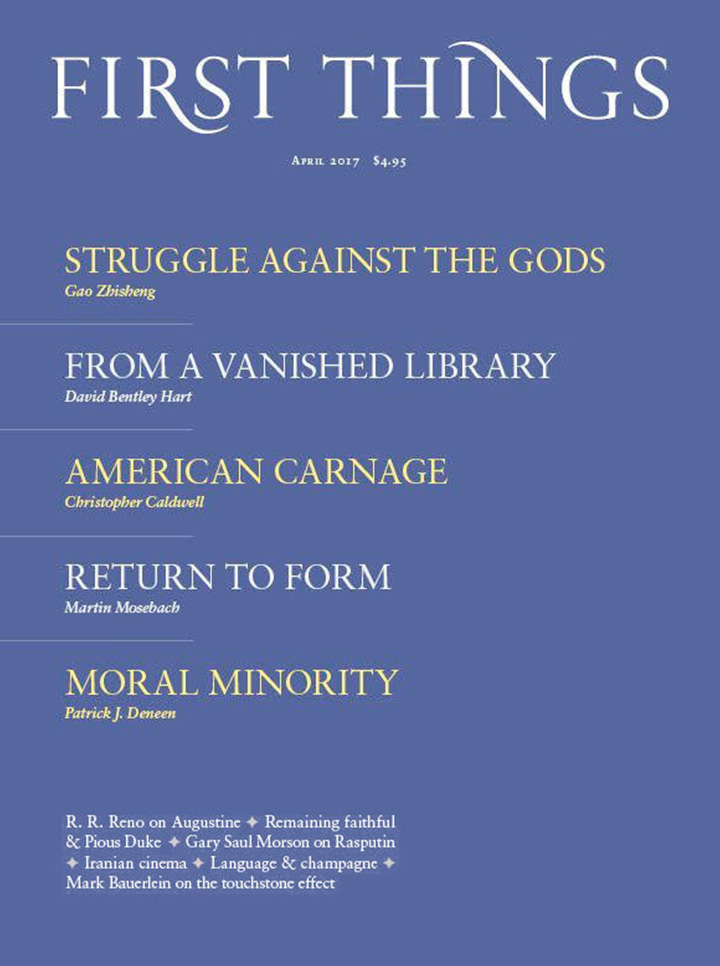Everyone should have a copybook of maxims. So I tell my students at the start of freshman year. “You will meet priceless bits of wit and wisdom in the next eight semesters—write them down and tap them often.” They hear it as bad advice, though. Don’t they have enough to do already?
But the young need these touchstones for just that reason, and so do the rest of us. The swirl of media never stops. I just counted on Wikipedia sixty-nine national sports TV networks in the United States, and that doesn’t include regional ones such as Fox Sports Arizona. Religion chalks up another twenty-seven television channels (Angel One, Hillsong . . .). Apart from local news in every metropolitan area, there are twenty-seven national news networks and twenty-two regional ones blasting images and commentary nonstop. These tallies don’t include radio, websites, Twitter, and Facebook.
The composed counsels of the wise help bring it under control. They provide a grounding service in the torrent of doxa and fabulae that hits as soon we wake up in the morning. Matthew Arnold characterized the expressions of the past in precisely these terms back in 1853, when the press of modernity was already being felt. As society grows more noisy and demanding, he said, “commerce with the ancients” produces “a steadying and composing effect.” It erects standards of beauty and insight that help us filter it all, interpreting what’s worth our attention and ignoring the rest.
When we read accounts of antireligious action such as Daniel Philpott’s tale of the Baptist florist in this issue (“Polite Persecution”), we grow unsteady and discomposed. I want to lash out. But then come the Lord’s words and the feeling changes. “If you were of the world, the world would love its own,” he tells the disciples; “but because you are not of the world, but I chose you out of the world, therefore the world hates you.”
With that prediction, frustration turns to calm in the face of today’s hostility. Of course, the ACLU and the state of Washington are going to target a believer if her faith gets in the way. Tension with secular institutions is inevitable, however much we seek to avoid it. We can eliminate tension and become fully comfortable with the world’s mandates only by downgrading Jesus’s call. If we do not expect more conflicts in the future, our faith is slipping. John 15:19 doesn’t ease Ms. Stutzman’s trials, but it does firm up our conviction in the rightness of her dissent.
As the moral weight falls on the secular side, we need the old voices to shift the balance. When the progressive vision of a society free of racism and sexism takes on the dimensions of a coercive utopian fantasy, it is time to reread the temptation of Eve (serpent to Eve: “And what are Gods, that Man may not become / As they . . .?” Paradise Lost, IX.716–717), and, if it gets worse, to invoke Orwell’s 2 + 2 = 5. When scientists frame human beings as neural machines, recall the hyper-rational rulers of Laputa in Gulliver’s Travels, whose instruments of measurement fail utterly to capture the whole person and turn the rationalists themselves into twisted souls.
Another reminder from the past has become particularly necessary at the present time. It is, in fact, a cornerstone of an argument pursued by our editor in chief for the past three years, the war-on-the-weak motif. I showed it to him the other day, and he laughed because it comes from Karl Marx, the most influential atheist of modern times. But Marx was also a perceptive critic of reform movements. In The German Ideology (composed from 1845 to 1846), explaining how classes supplant one another, he neatly identifies a distinct falsifying tactic of revolutionaries.
For each new class which puts itself in the place of one ruling before it, is compelled . . . to represent its interest as the common interest of all the members of society, that is, expressed in ideal form: it has to give its ideas the form of universality, and represent them as the only rational, universally valid ones.
The process isn’t complicated. Partial, class interest is presented as “common interest”; ideas that, in truth, are instrumental to one group become the “only” reasonable ones, the truth for everyone.
Marx never buys it, because in his theory universality never happens until classes disappear. But the universal claim—or at least claims that purport to transcend class—is a standard feature of progressive reform. Whereas the old left, from the Progressive Era to the Depression, openly asserted the interests of the “working man” and organized labor, advocates of feminism, diversity, and gender identity, and neoliberal economics, too, justify their positions as a generic social justice or economic freedom. They might begin with a specific set of people, be they dissatisfied suburban housewives in the 1950s, start-up entrepreneurs in the 1990s, or high school boys who think they are girls, but the expansion beyond the group and into the common good soon follows. The future of a liberal society depends on transgender bathrooms!
It’s a powerful rhetorical weapon. Free trade and open borders are said to raise all boats, not just corporate yachts. Affirmative action benefits not just black recipients but also white students in class with them, because more diversity yields more learning for everyone. The women’s movement is for all women, not just Betty Friedan types.
Wait a minute, Marx says. Why should we believe that a specific social policy affects equally groups who dwell in vastly different social circumstances?
Feminism was never for all women. It served the interests of upwardly mobile women, those who wanted advanced degrees and white-collar careers, not the rest. The outcome makes this clear. What was freedom for Murphy Brown—single motherhood by choice—has proven a burden for working-class and underclass women. We agree that the feminist assault on traditional sex roles has changed professional spheres for the better (medical schools and law schools are now 50 percent female), but it has left low-income women without the support of husbands and children without fathers.
Some conservatives, especially libertarians, don’t like the Marxist question. It smacks of class warfare. But I see no contradiction in posing Marx’s divisive question when the unity promised by a reform movement hasn’t materialized. It’s not just a rhetorical trick. It’s the exposure of a reality that liberalism papers over. In conversations with liberal friends and family, when they have spoken of pre-sixties morality in terms of patriarchal suppression, cheering its eclipse by new, more flexible mores, I find the best response is not to defend the past but to question the present. “Has sexual freedom helped the twenty-five-year-old woman with two kids by two men who are no longer around?” There are some 17 million single-mother families, and their poverty rate is 45 percent. Let’s talk about them, you say, not about the single-mother actress, CEO, and professor.
There lies the benefit of the copybook: It is filled with strong discursive weapons. Not many people make use of them, though. The other day in class, I covered Ben Franklin’s Autobiography and his self-improvement program, which included reading lots of books—no small charge for a poor apprentice printer. It became clear in discussion, however, that the acquisition of life lessons from the ancients was, to the students, a novel notion. The progressivism that undermines traditional authorities for the sake of a different future has succeeded with them.
That’s a shame, and odd, too, given the long-standing authority of elder sages. One of the common references from my youth was Bartlett’s Familiar Quotations, the compendium of eloquence and sagacity that started in 1855 and sold 300,000 copies by 1905. I have a Shorter Bartlett’s from 1953 that fits in a coat pocket but still honors the mission “to be an authoritative guide to the great and memorable passages of ancient and modern literature.” We have in the office the fifteenth edition from 1980, which took the unfortunate turn toward “relevance” and included forgettable lines such as “I could have danced all night” from My Fair Lady, “Viva la huelga [Long live the strike]!” the slogan of the United Farm Workers, and jingles from the Rolling Stones, Stevie Wonder, Janis Joplin, and Paul Simon. But the basic intent remained: Dip into Bartlett’s here and there to savor the best that has been said about all kinds of things; the more entries you memorize, the better equipped you are for civilized adulthood.
Sadly, this middlebrow project of building intelligence by collecting the gems of great wordsmiths is long dead. If I handed Bartlett’s to my students, some of them might understand the purpose, but none of them would take up the challenge. They’re too busy and they’ve got Google. Or maybe a couple of them would make an effort because they would sense the advantages of doing so. Many years later, when they are in a forensic setting or merely in conversation at a dinner party, the exchanges they have will be unequal. They have in their mental kits verbal tools the others don’t, and their superior formation will tell.


